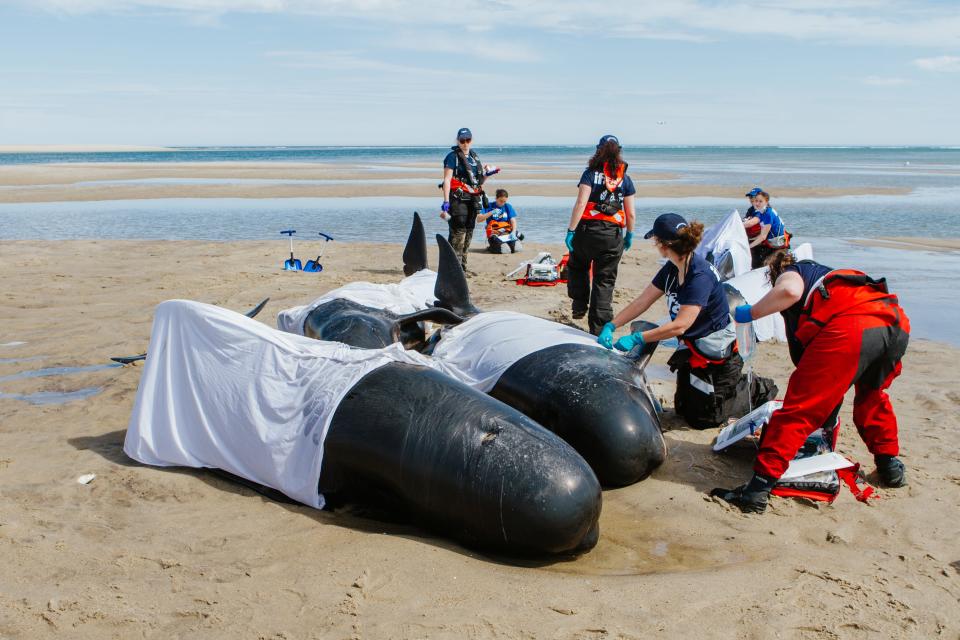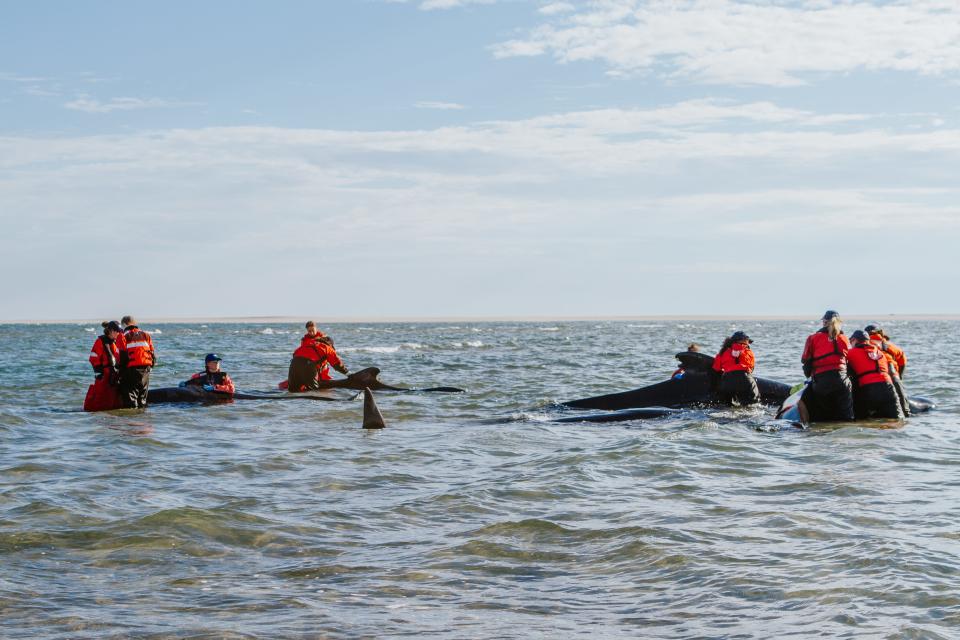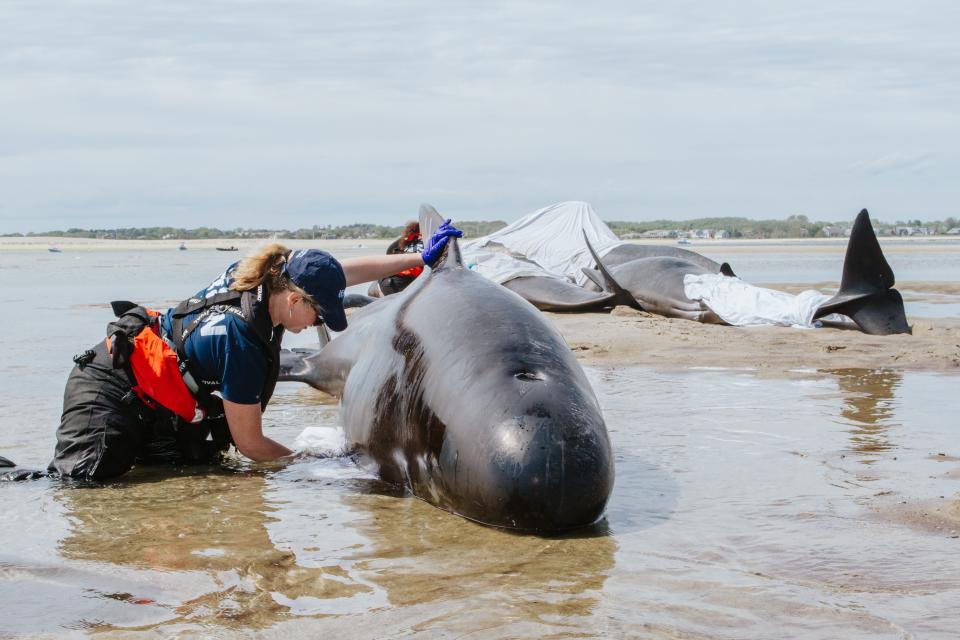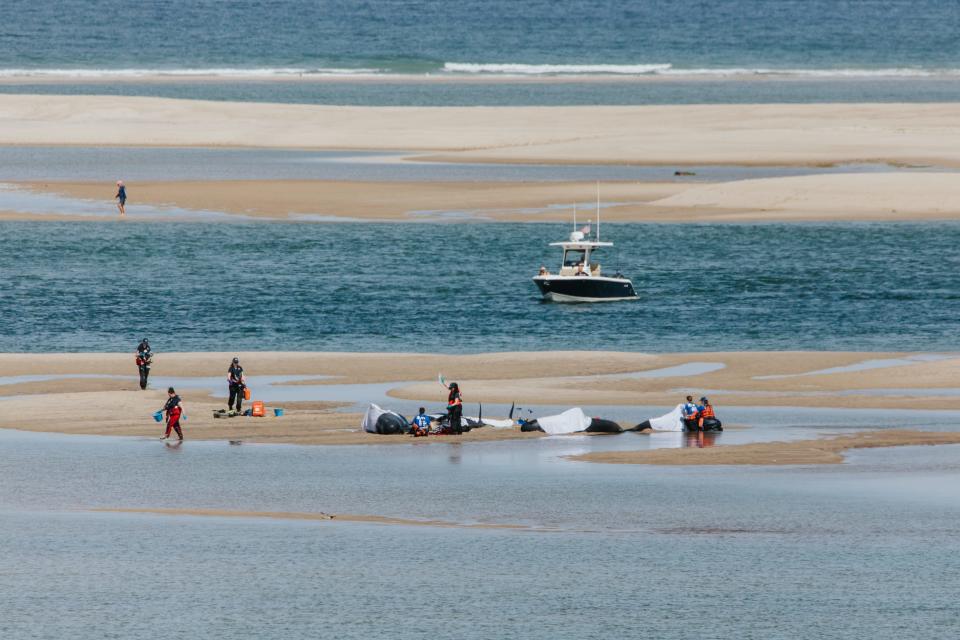Whale watch: Five pilot whales stranded on sandbar in Chatham Harbor
CHATHAM — Of five pilot whales stranded off Chatham Saturday, two escaped the harbor, two died and one continues to be monitored as it swims within the harbor.
The International Fund for Animal Welfare responded to multiple calls about the whales on its stranding hotline on Saturday afternoon, June 11, leading to a weekend-long rescue mission to care for and refloat the animals as quickly as possible. The whales were located across from Monomoy National Wildlife Refuge on a sandbar in Chatham Harbor.
This is typically how IFAW is alerted about wildlife strandings, IFAW Director of Marine Mammal Rescue & Research Brian Sharp said. As soon as they received the call, a volunteer responder in Chatham confirmed the scene and gathered details about the situation for the incoming team.

IFAW worked closely with the Harbormaster office, which established a safety buffer in the middle of the harbor, as well as US Fish and Wildlife, which provided an additional vessel to get the necessary equipment out to work on the whales.
The work of all three organizations allowed IFAW to begin to quickly cool the whales’ body temperatures and reduce their stress and shock from being stranded.
There were three male whales, one female and one whose gender was unknown, IFAW Communications Director Stacey Hedman said. They ranged in length from 11.5 feet to 16.5 feet. The largest two were likely adults and the other three sub-adults.
From the archives: Cape study offers hope for dolphins
“Two animals made it out on Saturday, two animals ended up re-stranding after we refloated, we worked until sunset trying to get those animals free, but without success,” Sharp said.
One of the five whales died from what Sharp said he assumed was stress and shock as the animals were starting to refloat at sunset Saturday. IFAW’s staff, veterinarian and volunteers were on the scene until about 9 p.m. to ensure the whales were in the best position possible to make it out of the harbor overnight.

On Sunday, there were two whales left in the harbor when IFAW got another call.
“We received another report in our hotline that one of those animals had stranded and so the team went out assessed the animal and unfortunately, its condition had deteriorated markedly, so the team performed a euthanasia in the field to end that animal’s suffering,” Sharp said.
The euthanized whale was showing the effects of stress and shock, as it had been stranded and re-stranded repeatedly for over 24 hours. A necropsy, or autopsy on the euthanized whale, will be done Wednesday.
From the archives: More help for strandings at Cape's other end
"This type of research may help us understand any potential reason for their stranding, but the ever-changing slope and sandbars (are a) likely cause in this area," Hedman said. "If one animal was previously sick, it could have potentially driven the group in."
IFAW is still monitoring the situation, as one pilot whale continues to swim in the harbor. Whether the animal makes it out of the harbor on its own will determine IFAW’s next step.

Short-finned pilot whales have been stranded on the Cape before, but Sharp considers it rare in this area. He identified these animals as most likely being long-finned pilot whales, which are often seen offshore near the Cape by NOAA aerial surveys. Issues tend to arise when the pilot whales decide to come in from offshore where it’s highly likely for them to get stranded on the constantly changing sandbars.
Earlier this year: Seven stranded dolphins rescued in Wellfleet, released at Provincetown beach
“The challenge is when those animals come in close to shore for whatever reason, whether it's feeding or whether they're swimming by or getting disoriented, and then suddenly end up inside the sandbars outside of Chatham,” Sharp said. "And that's part of what we think happened in this case.
“Part of the reason why the stranding team became formed on the Cape was because of pilot whale strandings,” Sharp added. “That shifted over time, and now we see more common dolphins than pilot whales, but pilot whales do still strand on the Cape.”

The changes in Chatham Inlet, such as how wide it has become, also make it a location for animals to become stranded at and difficult for humans to access, Sharp said. It is essential for anyone who sees a stranded animal to call the stranding hotline and maintain distance from the situation, he added.
The IFAW Stranding Hotline can be reached at 508-743-9548.
Ella Adams is a news intern for the Cape Cod Times.
This article originally appeared on Cape Cod Times: Pilot whales stranded on Chatham sandbar, IFAW works to rescue them

